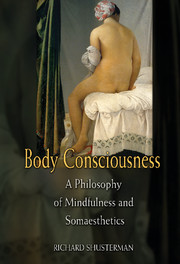Book contents
- Frontmatter
- Contents
- Preface
- Introduction
- 1 Somaesthetics and Care of the Self: The Case of Foucault
- 2 The Silent, Limping Body of Philosophy: Somatic Attention Deficit in Merleau-Ponty
- 3 Somatic Subjectivities and Somatic Subjugation: Simone de Beauvoir on Gender and Aging
- 4 Wittgenstein's Somaesthetics: Explanation and Melioration in Philosophy of Mind, Art, and Politics
- 5 Deeper into the Storm Center: The Somatic Philosophy of William James
- 6 Redeeming Somatic Reflection: John Dewey's Philosophy of Body-Mind
- Select Bibliography
- Index
5 - Deeper into the Storm Center: The Somatic Philosophy of William James
Published online by Cambridge University Press: 05 June 2012
- Frontmatter
- Contents
- Preface
- Introduction
- 1 Somaesthetics and Care of the Self: The Case of Foucault
- 2 The Silent, Limping Body of Philosophy: Somatic Attention Deficit in Merleau-Ponty
- 3 Somatic Subjectivities and Somatic Subjugation: Simone de Beauvoir on Gender and Aging
- 4 Wittgenstein's Somaesthetics: Explanation and Melioration in Philosophy of Mind, Art, and Politics
- 5 Deeper into the Storm Center: The Somatic Philosophy of William James
- 6 Redeeming Somatic Reflection: John Dewey's Philosophy of Body-Mind
- Select Bibliography
- Index
Summary
“The body,” writes William James, “is the storm centre, the origin of co-ordinates, the constant place of stress in [our] experience-train. Everything circles round it, and is felt from its point of view.” “The world experienced,” he elaborates, “comes at all times with our body as its centre, centre of vision, centre of action, centre of interest.” For purposes of survival, if not also for other reasons, “all minds must … take an intense interest in the bodies to which they are yoked … My own body and what ministers to its needs are thus the primitive object, instinctively determined, of my egoistic interests. Other objects may become interesting derivatively through association” with it.
Despite such powerful pronouncements and his many arguments to back them up, William James is rarely celebrated as a body philosopher, though he surely gives more careful attention to body consciousness than do more famously somatic philosophers such as Nietzsche, Merleau-Ponty, or Foucault. Perhaps his stature as a body philosopher has been eclipsed because the bulk of his somatic research is concentrated in his early book on psychology (of 1890) and because he devoted much of his later energy to topics of metaphysics, religious belief, and spiritualism. However, James's affirmation of the body's central importance extends throughout his entire career. The quote that opens this chapter comes from an essay of 1905 that James later appended to A Pluralistic Universe, which was published in 1909, the year before he died.
- Type
- Chapter
- Information
- Body ConsciousnessA Philosophy of Mindfulness and Somaesthetics, pp. 135 - 179Publisher: Cambridge University PressPrint publication year: 2008



